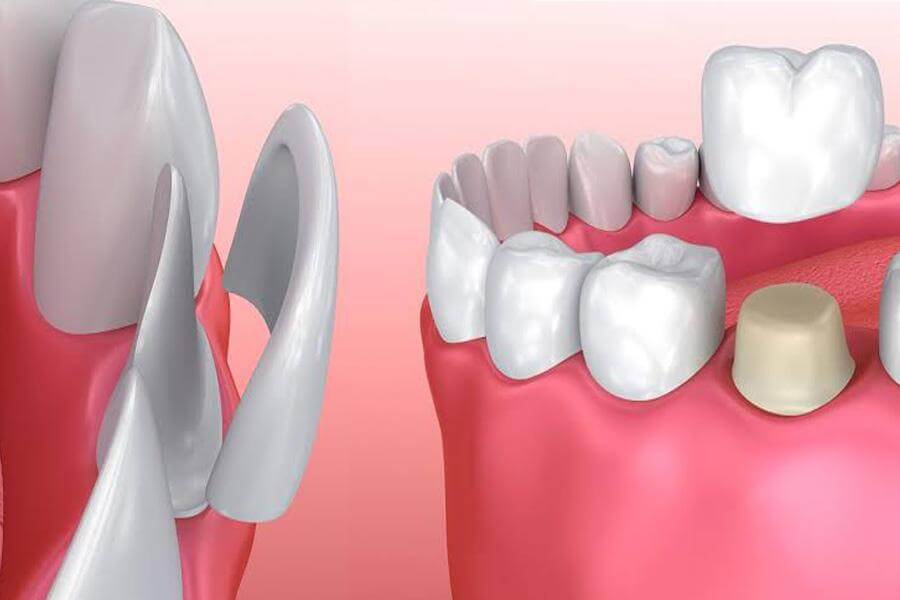
02 Mag Corone o faccette dentali? Quali sono le differenze?
Faccette e corone sono due tipi di soluzioni riparative che possono essere utilizzate per salvare il tuo sorriso. Entrambi possono migliorare l’aspetto e la funzione dei tuoi denti. Poiché sembrano offrire gli stessi vantaggi, molte persone presumono che le faccette e le corone siano la stessa cosa. Tuttavia, mentre questi due trattamenti possono sembrare simili, ci sono alcune differenze sostanziali tra loro. Per aiutarti a capire quale metodo di restauro dentale è giusto per te, ecco uno sguardo alla differenza tra faccette e corone, come funzionano e quando dovrebbe essere utilizzato ciascun metodo.
Cosa sono le faccette in Zircioni-EMAX?
Le faccette in Zirconio-EMAX sono costituite da sottili strati di porcellana dentale fine e resistente alle macchie e di solito hanno uno spessore di circa un millimetro. Le faccette sono un’opzione di odontoiatria estetica non invasiva, con la procedura che lascia intatta la maggior parte del dente esistente. Sono progettati su misura per ogni paziente in modo da coprire in modo sicuro la superficie anteriore del dente. Per preparare il dente per una faccetta in porcellana, il tuo dentista macinerà circa mezzo millimetro di smalto sulla parte anteriore del dente per facilitare l’adesione della faccetta, poiché il cemento aderirà meglio a una superficie più ruvida. Tuttavia, la quantità di smalto da limare può variare a seconda del tipo di rivestimento. È importante notare che una faccetta può essere posizionata solo su un dente che ha molto smalto esistente.
Cosa sono le corone dentali?
Una corona dentale copre completamente l’intero dente, il che significa che sarà necessario limare una parte maggiore del dente prima di poter posizionare una corona. Le corone sono generalmente utilizzate per ripristinare i denti che sono stati gravemente danneggiati da carie, crepe o fratture. Se la carie è la ragione per cui hai bisogno di una corona dentale, il tuo dentista dovrà rimuovere la parte cariata ed eventualmente ricostruire parte del dente in modo che possa sostenere la corona. Le corone dentali sono solitamente modellate da Zirconio e Ceramica, che sarebbero anche i materiali piu usati nella dentistria moderna. Il laboratorio della clinica fabbricherà la corona per adattarla saldamente al tuo dente e poi sara il medico odontoiatrico a cementerla in posizione.
Faccette vs corone: come sono simili?
Sia le faccette che le corone sono trattamenti dentali che migliorano l’aspetto e la funzione dei denti. Sono in genere utilizzati per ripristinare i denti che sono in qualche modo danneggiati, siano essi scoloriti, storti, cariati, scheggiati, incrinati o rotti. Le faccette e le corone sono entrambe realizzate per abbinarsi al colore del resto dei tuoi denti, ad eccezione delle corone interamente in metallo, per darti un sorriso perfetto e completo. Una volta applicati, è difficile distinguere tra una faccetta e una corona perché avranno entrambi un effetto simile sul tuo sorriso. Ti occuperai sia delle faccette che delle corone praticamente allo stesso modo. Dovrai lavarli due volte al giorno proprio come il resto dei tuoi denti e usare il filo interdentale per rimuovere le particelle di cibo. Saranno necessarie anche visite regolari dal dentista per la pulizia professionale e per controllare i restauri.
Faccette vs corone: come sono diverse?
La più grande differenza tra faccette e corone è come si adattano al tuo dente e il motivo per cui ne hanno bisogno. Una faccetta in Zirconio-EMAX è legata solo alla superficie anteriore del dente, mentre una corona dentale copre l’intero dente. Questo tende a rendere le faccette esteticamente più gradevoli delle corone perché mostrano meno margini gengivali. Le corone sono più spesse delle faccette, due millimetri rispetto a un millimetro, e sono più permanenti. Potrebbe essere necessario sostituire le faccette dopo un certo numero di anni, ma le corone potrebbero durare la maggior parte della tua vita.
Un’impiallacciatura o una corona è adatta a me?
Poiché le faccette e le corone sembrano fornire sostanzialmente la stessa funzione, possono essere utilizzate in modo intercambiabile, giusto? In realtà no. Il tuo dentista ti consiglierà un’opzione di trattamento dentale rispetto all’altra in base alla tua situazione specifica. Le corone dentali sono in genere l’opzione migliore se il tuo dente è molto danneggiato, ha una grande otturazione o ha subito un trattamento canalare, poiché lo smalto dei denti è più compromesso e avrà bisogno di una migliore protezione. Le faccette in Zirconio-EMAX, d’altra parte, sono le migliori per scopi puramente cosmetici. Se il tuo dente è per lo più intatto e necessita solo di una piccola correzione della forma o di un aspetto migliore, allora il tuo dentista probabilmente consiglierà faccette in Zirconio-EMAX.






Sorry, the comment form is closed at this time.